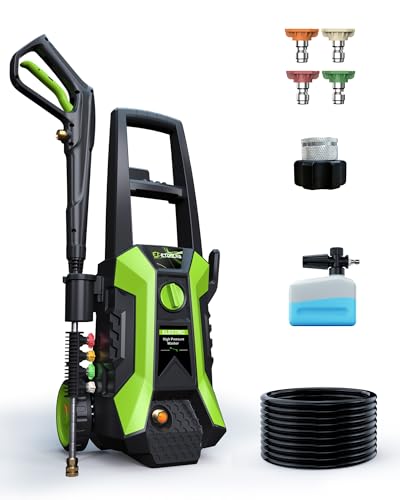Do you love to go boating in Miami? Boats are a great way to enjoy the ocean breeze and take in all the sights of this beautiful city. However, owning a boat can be difficult when cleaning it. When exposed to saltwater, boats get dirty very quickly.
Pressure washing is one easy way for boat owners to keep their vessels looking fresh and clean! This blog post will discuss how pressure washing your boat is an eco-friendly task that doesn’t harm your boat or yourself!
Why Should I Pressure Wash My Boat?
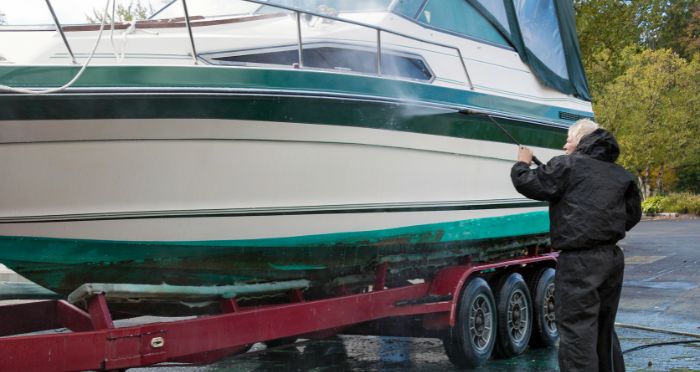
Pressure washing a boat is a practical, low-cost way to remove dirt and grime from the surface. It allows all of your vessel’s features to be visible. Boat owners often want their vessel’s paint job clean & shiny, and pressure washing can make it sparkle like new!
Pressure washing is also a preventive measure for boats left in saltwater. The sea has very harsh chemicals that corrode the metal components of your ship, like the propellers and rudders. Pressure cleaning your boat helps prevent corrosion, which can cause irreparable damage to your vessel’s parts.
There is also a safety element to pressure washing your boat – debris and dirt accumulating on the vessel’s surface can cause hazardous situations. For example, if your ship is in the water and has a lot of dirt on its surface, you could mistake submerged debris as something safe to stand on. If you jump from your boat onto the submerged rocks, it could be hazardous for yourself or others!
When Should I Pressure Wash My Boat?
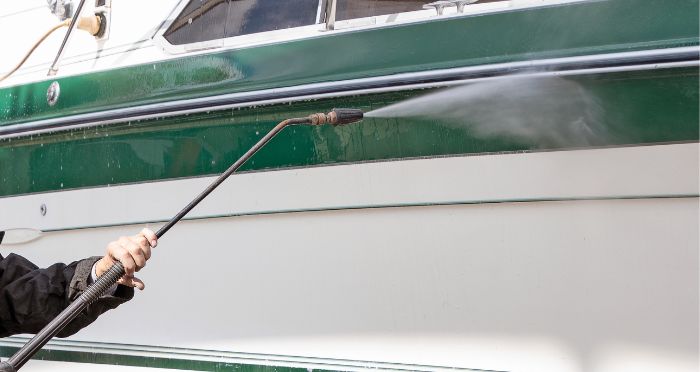
Pressure washing should be performed regularly, especially when exposed to saltwater. In addition, it is much easier for boat owners to maintain their vessels when they’re constantly pressure washing.
For example, if you live near the coast and your boat is always in salt water, you should pressure wash it every two weeks. It allows the saltwater to be correctly removed from your vessel’s surface before oxidation occurs and corrosion starts to set in.
Regular pressure washing will also help you spot any damages that may be occurring on your vessels, such as cracks or leaks. Performing this task can address any problems before they become worse and costlier to repair.
While the frequency of pressure washing depends on the boat owner, it is essential to perform this task regularly. If you don’t own a boat but are interested in learning more about pressure washing, many different boat owners would be happy to teach you!
Pressure Washers for Cleaning a Boat

You will require a household pressure washer rather than an industrial one. Industrial-strength pressure washing machines are not suitable for boat use due to heavy-duty usage, including removing oil stains from paved areas and other rigorous tasks.
Pressure washers are available in three primary forms: Heavy, medium, and light-duty.
For this work, light or medium-duty pressure washer is required.
You can complete small chores around the house with light-duty pressure washers. For example, you may utilize them to clean small decks or patios and outdoor walls. However, these high-pressure washers aren’t appropriate for cleaning boats; the only exception is when they’re very tiny. Check any dirt left behind; you can wipe specific locations away if the pressure washer fails to clean.
Medium duty pressure washers are ideal for most household chores. For example, they’re lovely for cleaning automobiles in low-pressure settings, such as cars, trucks, and boats.
Steps To Pressure Washing Your Boat
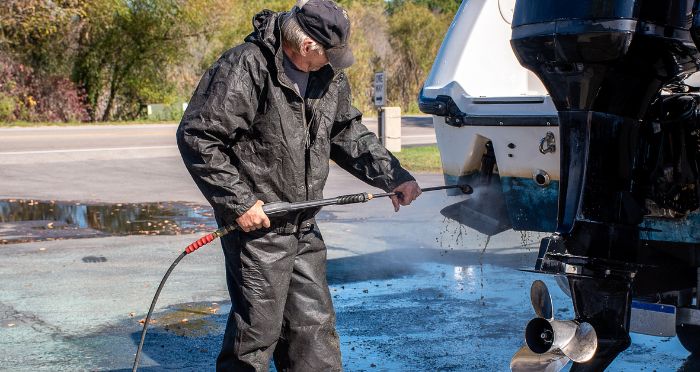
Pressure washing your boat is very similar to washing your automobile or truck. Here are the steps to follow:
- Ensure that any loose equipment or goods are removed to avoid getting pushed about during the cleaning process.
- Before turning on your pressure washer and starting work, close all doors, windows, hatches, and portholes.
- Make sure you’re using a biodegradable cleaning solution that the pressure washer’s User’s Manual approves of. Using any form of ammonia on your boat or washer will damage them, so be careful.
- Then spray the boat from the bottom up to minimize streaking using a pressure washer soap nozzle.
- Allow 5-10 minutes for the detergent to soak in a while, keeping the boat hull, deck, and other surfaces wet.
- If stains and mildew/algae persist, utilize a scrub brush attachment with a rotating action.
- Use a soft-bristled brush if necessary for more stubborn stains.
- It’s time to rinse the detergent top-down now that you’ve let it sit.
- Attach a 25-degree nozzle and pull the pressure gun trigger for a few seconds to clear the detergent.
- Finally, rinse the boat from top to bottom. Ensure that dirt and unwanted grime wash off the boat.
Notes
- Don’t forget to include the motor and trailer when pressure washing. Would you please keep away from the motor to avoid clogging it with many detergents?
- After you finish pressure washing, make sure to flush out the motor as you usually would get rid of any detergent that may have entered it.
What Is The Ideal Power Washer For The Job?
Any of the finest medium-duty pressure washers would be perfect for the task.
Last update on 2024-07-15 / Affiliate links / Images from Amazon Product Advertising API
Wrap Up
Now that you’ve learned, you can do pressure washing a boat safely and effectively. It’s time to go out there and do the job.
Pressure washing is a great way to save money on boat maintenance. You can pressure wash your boat at home or, if you prefer, hire a pressure washing company to do it for you.
Just make sure that if you hire someone else to pressure wash your boat, they are using the proper pressure washer and pressure washing equipment.
Shop Related Products


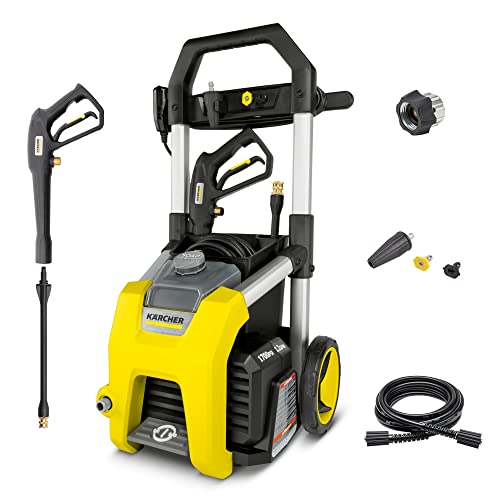
Last update on 2024-07-20 / Affiliate links / Images from Amazon Product Advertising API





